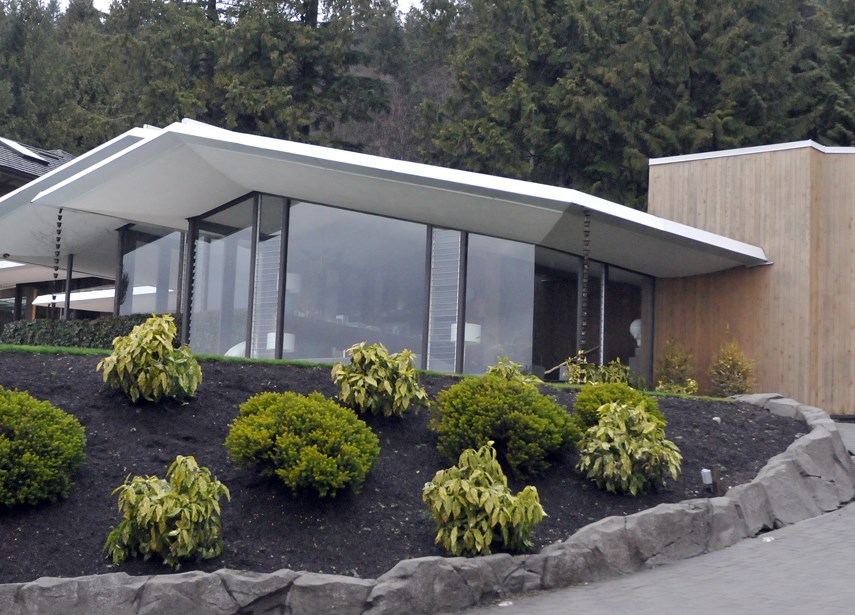District of West Vancouver council is one vote a way from putting permanent heritage protection on a Ron Thom masterpiece of West Coast Modern architecture the owner is planning to demolish.
If approved, it would be the first time the municipality has ever forced heritage protection on a property owner who didn’t want it.
In November last year, the owner of Thom’s award-winning 1962 Forrest-Baker residence at 1143 Eyremount Dr. applied to demolish the home for redevelopment. Council halted the bulldozer for 60 days while attempting to negotiate with the owner to save the home in exchange for greater density elsewhere. When that failed, council gave first reading to a bylaw that would give the property legal protection and stop demolition for another 60 days.
Under the law, the municipality must compensate the owner for the value their property loses as a result of an involuntary heritage designation.
After a unanimous vote by council Tuesday night to advance the heritage designation process, Mayor Mary-Ann Booth acknowledged that council was stepping into uncharted territory.
“This is the first time ever that I am aware that we have taken this rather courageous step to protect an award-winning, distinctive, valued and beautiful piece of West Van’s heritage and identity,” she said. “We’ve done this because what we’ve done in the past hasn’t worked.”
Before the heritage protection comes into effect, council must still give the bylaw fourth and final reading, which is usually a formality but in this case, it appears to be more of a bargaining chip.
Immediately after passing third reading Tuesday, council unanimously passed another motion from Coun. Craig Cameron stating they will not carry on with fourth reading “unless and until staff are unable to conclude an agreement with the owner to preserve the house.”
Cameron said he introduced the motion because he remains hopeful the owner will be reasonable and negotiate a heritage revitalization agreement. “In this situation, quite frankly, I’ve been quite disappointed in the owner. It seems like they’re playing games,” he said. “I’m looking for a solution that doesn’t burden the taxpayer, that leaves the owner fairly compensated and that preserves the house.”
The vote followed a public hearing in which heritage advocates turned out to beseech council to save the home.
“It’s going to be a collective good for the district, for the citizens of West Vancouver, for homeowners, for neighbours and for the next generations who will know from where we come from,” said Adele Weder, founder of the West Coast Modern League. “These gems of houses are so much of what makes West Vancouver interesting in the first place and what’s made it desirable.”
Retired architect Tom Bowen also urged council to not let another unique piece of design be razed for speculation. “There’s no question that this has to be preserved,” he said. “I think we have to worry about speculation and just putting value on the land. It’s more than the land. It’s the whole built environment and the community that it creates.”
British Properties resident Wing Wing Fung said her neighbourhood had already lost too many West Coast Modern homes, all of which represented a fundamental shift in the way we look at homes and the world around them.
“Please save whatever ounce of culture and art there is left in the British Properties in West Van,” she said.
Thom’s son Adam flew in from Toronto to attend the public hearing but did not address council.
Not everyone was encouraging the district to dive in though.
Genine McCurdy, who lives in a heritage home, advised council not to force the designation on an unwilling owner.
“A heritage designation has a lot of value, but it has to be valued by everybody,” she said. “As an owner, you can’t afford to run a museum on behalf of an organization or on behalf of the municipality.”
No one representing the owner spoke at the public hearing. Coun. Nora Gambioli said she needed to know more about how much compensation the owner would be in line for.
“We’re talking potentially about some really significant numbers and I wonder whether the community is actually ready for this,” she said. “I am really concerned about the compensation that taxpayers would have to provide, given our budget discussion two weeks ago and the fact we don’t think we have enough money for things like climate emergencies.”
If council does go ahead with the heritage designation, the owner may apply to the municipality for compensation for the reduction in market value. If the two sides aren’t able to agree on how much that is, the matter has to be determined by binding arbitration.
Following the meeting, Kathleen Staples, founder of the Binning Heritage Society, which spearheaded the campaign to protect the house, said she was remaining optimistic.
“We’re very happy progress seems to be going in the right direction. Nobody is counting any chickens before they hatch,” she said. “[Council] could be bluffing. They might be playing both hands of the wicket but they have twice now voted for the 60-day halt and they’re taking staff time, which is significant, to go through the process.”
Prior to the meeting, someone took it upon themselves to send an anonymous letter to the property owners of every home listed on the district’s heritage list, warning them council’s decision would set precedent for the district to expropriate their homes without compensation. The letter was roundly condemned by council, staff and heritage homeowners who attended the meeting for being full of deceptive statements.
Because the public hearing is now closed, council members may not legally accept any more calls or emails on the matter.



